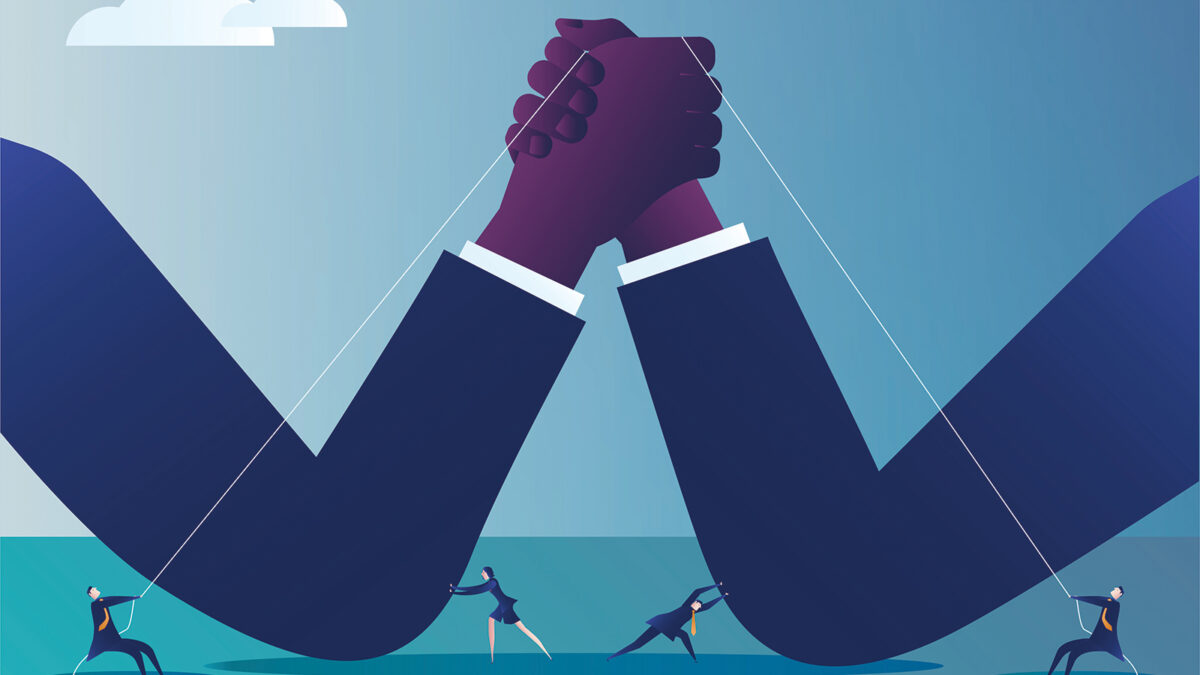
The Paradox of Professional Rivalry
Why Lawyers Don’t Always Like Other Lawyers
November 2023
Download This Article (.pdf)
While lawyers are united by a shared commitment to justice, they are not immune to the age-old paradox: lawyers don’t always like other lawyers. This intriguing phenomenon is deeply rooted in the adversarial nature of the legal profession, which places lawyers at odds with their own kind. Although professional sparring is an anticipated demand of lawyering, the line between zealous advocacy and personal attack is frequently blurred. It is not uncommon to hear stories of harassment, shouting, and lambasting from one lawyer to another. This type of behavior is frequently not admonished by judges, decision-makers, legal employers, and regulators, leaving lawyers to process and respond to such abusive behavior on their own.
Many seek to explain this behavior through the simple narrative that all lawyers are unhappy, or the practice of law is a soul-sucking endeavor. However, this lens is inaccurate and unhelpful, as many happy, thriving lawyers still encounter the paradox of professional rivalry and its effect on their relationship with other lawyers. This paradox not only gets in the way of professional relationship building, but also undermines opportunities for mentoring, good role modeling, and socializing new lawyers into the profession.
The legal profession is layered with paradoxes that keep lawyers from authentically connecting and communicating with one another. In better understanding these paradoxes, lawyers can strive to bridge the gaps that hinder genuine connections and foster more effective communication within the legal community.
The Paradox of Professionalism
The legal profession is often hailed as a bastion of professionalism, characterized by strict adherence to ethical standards, unwavering commitment to clients, and an unyielding dedication to justice. Yet beneath this seemingly impenetrable veneer of professional conduct lies a complex paradox that lawyers must navigate daily. This paradox creates unique challenges that can sometimes hinder authentic connections and effective communication among lawyers.
Coined by Sunita Sah, the “professionalism paradox” illuminates a dark side of professionalism that can lead those most bound by professionalism standards to have the least underlying principles and values to meet those standards.1 This is the difference between what Sah calls “deep” and “shallow” professionalism. Deep and shallow professionalism represent different understandings of what constitutes professional behavior and what is needed to enact it. A “shallow” understanding of professionalism is demonstrated by a belief that one’s ability to self-regulate is sufficient to counteract the influence of stressors, emotions, and conflicts of interest on a person’s professional behavior.2 A “deep” understanding of professionalism, on the other hand, involves both an awareness of one’s fallibility and corresponding consistent professional behavioral practices.3 Sah’s research has found that a high self-concept of professionalism, such as that found in lawyers and legal professionals, often goes hand-in-hand with a shallow understanding of what professionalism means and serves the belief that one is resilient to unwanted influence on professional behavior.4
The legal profession is anchored in principles of professionalism, which can provide a false sense of aptitude for engaging in professional behavior. Many lawyers exhibit Sah’s “shallow” understanding of professionalism wherein they overlook the impact of outside influences on one’s ability to maintain professionalism in practice. When we overestimate the level of professionalism in our behavior, we are less able to regulate our unprofessional approaches to communication and relationship building. Unfortunately, some of the biggest proponents of professionalism in law practice are guilty of engaging in the most toxic behavior toward other lawyers.
As lawyers, we must develop a “deep” understanding of professionalism, which allows us to more fully understand the ways in which our stress, emotions, clients, and individual temperaments influence our professional behavior. We cannot simply rely on our “principles” of professionalism to manifest professional behavior.
Ironically, when the paradox of professionalism results in unprofessional behavior, a secondary professionalism paradox emerges. When lawyers perceive their colleagues as falling short of meeting professionalism standards, it can create a sense of disdain or mistrust. Instances of unethical behavior or perceived breaches of professional conduct can strain relationships among lawyers. Accusations of dishonesty or unethical practices can lead to legal disputes and damage reputations, making it difficult for lawyers to maintain cordial relations with their peers. Eventually, these dueling paradoxes keep lawyers stuck in a cycle of competing professional experiences and expectations, all the while reducing opportunities for relationship building and expanding opportunities for disconnection.
The Paradox of Ego
One of the primary reasons lawyers may not always get along is the inherently competitive nature of the profession. Lawyers are trained to advocate for their clients vigorously and to use their legal acumen to secure favorable outcomes. In this cutthroat environment, where the stakes are high and the pressure intense, it’s easy for rivalry to emerge among attorneys.
Competition is a double-edged sword. On one hand, it drives lawyers to excel and continuously improve their skills. On the other hand, it can foster an atmosphere of mistrust and suspicion. Lawyers often view their peers as competitors for clients, cases, and career opportunities, which can create a sense of unease or even animosity. We’ve seen this paradox in requests for mentoring where a prospective mentor will turn down the opportunity to work with a mentee out of concern for “training their competition.” The paradox of ego can keep lawyers from leaning into connection in favor of the power of competition.
Like any profession, the legal field is composed of individuals with unique personalities and egos. Lawyers, by the nature of their work, are often assertive and argumentative, qualities that can sometimes lead to interpersonal friction. The legal community attracts ambitious individuals who are accustomed to defending their positions vigorously, and this can spill over into personal interactions.
Moreover, the competitive nature of the profession can feed into ego-driven behavior. Lawyers may feel the need to assert their dominance, prove their worth, or establish their superiority over their peers. Such dynamics can contribute to an environment where lawyers are less likely to genuinely like or trust one another.
Limiting the influence of ego on professional interactions is crucial for fostering positive relationships, effective collaboration, and personal growth. Below are some strategies for limiting the impact of ego in the legal profession.
- Observe your behavior: The first step in managing ego is acknowledging its presence. Be aware of the signs of ego-driven behavior, such as defensiveness, competitiveness, or the need to be right.
- Practice active listening and empathy: Pay close attention to what others are saying without interrupting or immediately offering your own opinions. Listen to understand, not to respond. This can help you develop a deeper understanding and reduce ego-driven biases.
- Embrace humility: Understand that no one is infallible, and everyone makes mistakes. Admit when you’re wrong and be open to learning from others.
- Seek feedback: Ask for feedback from colleagues, superiors, and subordinates. Accept feedback gracefully and use it as an opportunity for self-improvement.
- Develop a collaborative mindset: Approach professional interactions with a mindset focused on achieving common goals rather than promoting your own interests. Emphasize teamwork and cooperation.
- Manage your emotions: Learn to control emotional reactions and avoid outbursts or defensive responses. Emotional intelligence helps in dealing with difficult situations gracefully.
- Consider your core values: Reflect on your personal and professional values and align your actions with them. This can help you prioritize ethical behavior over ego.
- Cultivate a growth mindset: Embrace the idea that you can always learn and improve. This mindset can help you remain open to new ideas and perspectives.
The Paradox of Professional Identity
Who we believe we “are” as lawyers can also have a determinantal impact on our ability to relate to one another. Professional identity is the way a lawyer understands their role relative to all of the stakeholders in the legal system, including clients, courts, opposing counsel, the firm, and even the legal system itself (or society as a whole).5 A well-defined professional identity can guide lawyers to make decisions about their practice area, work environment, community engagement, and values as a practitioner. Unfortunately, many lawyers struggle to cultivate and use a professional identity to support themselves in designing a professional experience that is aligned with their unique skills and personal values. A lack of professional identity for lawyers has been shown to correlate with burnout, professional and civil behavior, and disciplinary issues in practice.6 Lawyers who are burnt out, unprofessional, and facing disciplinary action are not likely to connect positively with other lawyers.
The paradox of professional identity arises in a lawyer’s socialization into the profession.7 When lawyers are socialized into the profession, usually in law school, they begin to take on the roles and attitudes of others in their world. Those who enter the profession without a well-defined professional identity can be shaped by the attitudes of role models, mentors, professors, colleagues, and so on. Those lawyers who are already burnt out and conducting themselves unprofessionally simply pass these attributes along to the next generation of lawyers, perpetuating a cycle of disconnection among practitioners.
The second paradox of professional identity occurs when well-defined professional identities create a diversity of legal philosophies and approaches. The legal profession encompasses a wide range of practice areas, each with its own set of principles and values. Within these areas, lawyers may hold differing views on how to interpret and apply the law. These divergent perspectives can lead to conflicts, both professional and personal.
For example, a criminal defense attorney might clash with a prosecutor over their opposing roles in the justice system. A corporate attorney may have philosophical differences with an environmental lawyer regarding the balance between business interests and environmental protection. These disparities in belief systems can create rifts among lawyers, making it challenging for them to see eye to eye.
Despite the potential for philosophical disagreements that may arise from divergent professional identities, the values, beliefs, and attitudes of lawyers as encompassed by their professional identity can be a pathway to connection and finding one’s community and people. Additionally, professional identity cannot be created in a vacuum. It is through relationships, observation, and discussion with good role models that lawyers discover more about who they are and who they want to be professionally.
Conclusion
While lawyers are united by their dedication to the pursuit of justice, the complex nature of the legal profession often leads lawyers to develop negative feelings toward other attorneys. Factors such as competition, divergent legal philosophies, personality conflicts, ego, and the imperative to maintain professional ethics all contribute to this paradox.
However, it’s important to note that not all lawyers harbor animosity toward their colleagues. Many legal professionals develop strong and respectful working relationships with their peers, recognizing the value of collaboration and camaraderie within the legal community.
Discord among lawyers should not overshadow the vital role we collectively play in upholding the principles of justice. When we understand the professional paradoxes that can cause lawyers to not always like each other, we can better manage the dynamics that get in the way of connection and community. After all, we are united by a shared commitment to access to justice, the betterment of society, and the improvement of the legal system.
Notes
1. Sah, “The Professionalism Paradox: A Sense of Professionalism Increases Vulnerability to Conflicts of Interest,” 36(3) Acad. of Mgmt. Perspectives (Aug. 18, 2022), https://journals.aom.org/doi/10.5465/amp.2021.0033.
2. Id.
3. Id.
4. Id.
5. Katz, “Teaching Professional Identity in Law School,” 41 Colo. Law. 45 (Oct. 2013), https://www.law.du.edu/documents/dean/TeachingProfessionalIdentity.pdf.
6. Walsh Fitzpatrick and Queenan, “Professional Identity Formation, Leadership and Exploration of Self,” Univ. of Mo.-Kan. City L. Rev. (Dec. 29, 2020), https://papers.ssrn.com/sol3/papers.cfm?abstract_id=3719354.
7. Taekema and Riesthuis, “Space and Socialization in Legal Education: A Symbolic Interactionism Approach,” Law and Method (Apr. 2021), https://www.lawandmethod.nl/tijdschrift/lawandmethod/2021/04/lawandmethod-D-20-00006.
Competition is a double-edged sword. On one hand, it drives lawyers to excel and continuously improve their skills. On the other hand, it can foster an atmosphere of mistrust and suspicion. Lawyers often view their peers as competitors for clients, cases, and career opportunities, which can create a sense of unease or even animosity.


